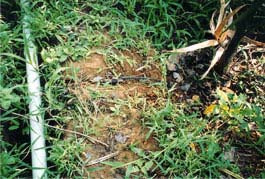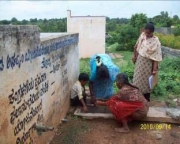/topics/treatment-and-purification
Treatment and Purification
Water and a City A film by Swati Dandekar that narrates the story of water in Bangalore
Posted on 22 Nov, 2014 10:30 AMDirected and produced by Swati Dandekar, 'Water and a City' traces the journey of water through Bangalore using a succession of haunting ima
Strengthen participatory urban governance to prevent pollution in Ganga at Kanpur and recognise the need to look for decentralized solutions
Posted on 22 Nov, 2014 10:30 AMA one day Area Water Partnership Conference was held on 22nd July, 2012 by Shramik Bharti, Kanpur; Society for Action in Community Health (SACH) and Society for Promotion of Wastelands Development (SPWD), New Delhi at Jajmau, Kanpur, an industrial city on the banks of the Ganga which also happens to be a major centre for leather tanneries, which let out
Wastewater recycle and reuse The need of the hour Report of a workshop in April 2012 organised by Ministry of Urban Development
Posted on 22 Nov, 2014 10:30 AMA one day workshop on "Wastewater Recycle and Reuse: The need of the hour' was organized by Ministry of Urban Development, Government of Indi
Excreta Matters A profile of the water and sewage situation in 71 Indian cities A report by the Centre for Science and Environment
Posted on 22 Nov, 2014 10:30 AMGuset post: Amita Bhaduri

Source: Excreta Matters, Centre for Science and Environment, 2012
Bottle it up: we can use it! A scientific study on human urine as fertiliser
Posted on 22 Nov, 2014 10:30 AM
Toilet manure in organic farming :An article by Varanashi Research Foundation
Posted on 22 Nov, 2014 10:30 AM Human faeces and urine (toilet manure) are a serious waste disposal problem especially in areas with high human population density. At the same time they are rich in nutrients that are essential to plants.
Human faeces and urine (toilet manure) are a serious waste disposal problem especially in areas with high human population density. At the same time they are rich in nutrients that are essential to plants.
Guidelines for water safety plans for rural water supply systems A document by SIAES and WHO India 2009
Posted on 22 Nov, 2014 10:30 AM Delivery of safe drinking water is vital for protecting public health and of promoting more secure livelihoods.
Delivery of safe drinking water is vital for protecting public health and of promoting more secure livelihoods.
The traditional approach to water quality and safety management has relied on the testing of drinking water, as it leaves the treatment works or at selected points, either within the distribution system or at consumer taps. It is referred to as ‘end‐product testing’.
Application of Composite Correction Program for improvement in efficiency of water treatment plants A WHO paper
Posted on 22 Nov, 2014 10:30 AMThe goal of safe and affordable drinking water and sanitation has not yet been achieved. The current practices of water purification are inadequate to produce secured water supply. Maintaining health protection at water supply systems has become more challenging with resistance of some pathogens to disinfection using chlorination and an increase in the immuno-compromised population (e.g., people with HIV, organ transplant patients, the elderly).
In this context, it has become essential to develop various tools such as Composite Correction Programme (CCP) and Water Safety Plans (WSP) to improve water purification and distribution systems, to achieve the goal of providing safe drinking water.
Access and behavioral outcome indicators for water sanitation and hygiene by USAID Hygiene Improvement Project
Posted on 22 Nov, 2014 10:30 AM- Access and behavioral outcome indicators for water, sanitation, and hygiene by USAID Hygiene Improvement Project
The document highlights the evidence that has accumulated based on the reliable assessment and validation of hygiene practices – practices that are critical for the prevention of diarrheal diseases and the reduction of child morbidity and mortality.
Benefits issues and status of WATSAN systems A survey of an IDWM project supported by Arghyam
Posted on 22 Nov, 2014 10:30 AM This paper presents the results of a survey of WATSAN systems implemented under an Integrated Domestic Water Management (IDWM) project supported by Arghyam and implemented by MYRADA and MYKAPS in Bangarpet and H D Kote blocks of Kolar district of Karnataka. Arghyam has promoted Roof-top Rain Water Harvesting (RRWH) and eco-sanitation systems in its various project areas through its partner organizations.
This paper presents the results of a survey of WATSAN systems implemented under an Integrated Domestic Water Management (IDWM) project supported by Arghyam and implemented by MYRADA and MYKAPS in Bangarpet and H D Kote blocks of Kolar district of Karnataka. Arghyam has promoted Roof-top Rain Water Harvesting (RRWH) and eco-sanitation systems in its various project areas through its partner organizations.
This project aimed at developing an integrated approach to domestic water management. It focused on construction of RRWH and eco-sanitation toilets in four villages in the project area in Kolar with the aim of creating models of integrated management of domestic water and sanitation in a rural set-up.





